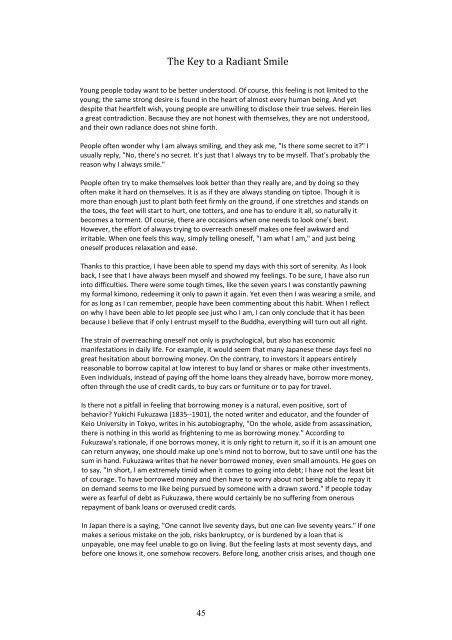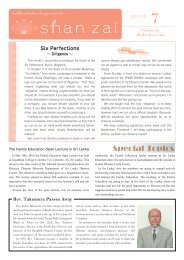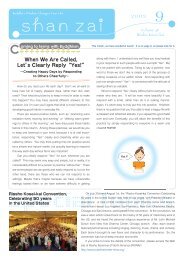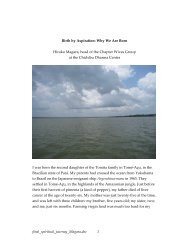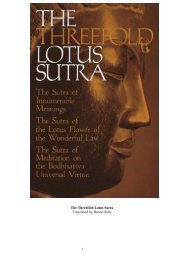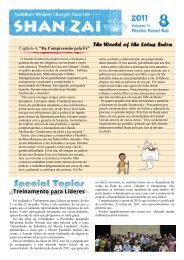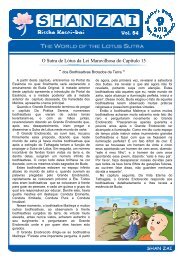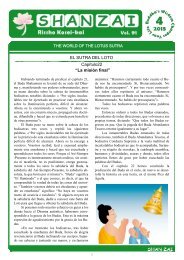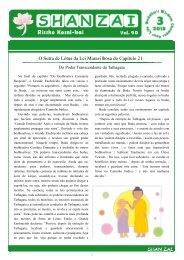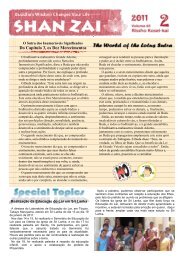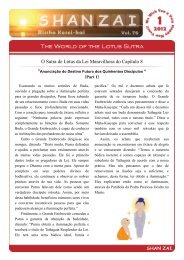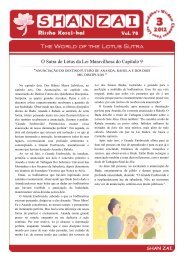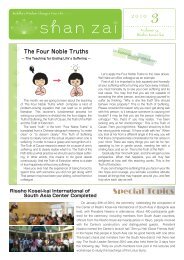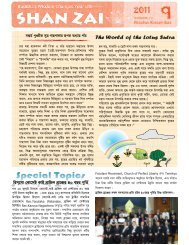Create successful ePaper yourself
Turn your PDF publications into a flip-book with our unique Google optimized e-Paper software.
The Key <strong>to</strong> a Radiant SmileYoung people <strong>to</strong>day want <strong>to</strong> be better unders<strong>to</strong>od. Of course, this feeling is not limited <strong>to</strong> <strong>the</strong>young; <strong>the</strong> same strong desire is found in <strong>the</strong> heart of almost every human being. And yetdespite that heartfelt wish, young people are unwilling <strong>to</strong> disclose <strong>the</strong>ir true selves. Herein liesa great contradiction. Because <strong>the</strong>y are not honest with <strong>the</strong>mselves, <strong>the</strong>y are not unders<strong>to</strong>od,and <strong>the</strong>ir own radiance does not shine forth.People often wonder why I am always smiling, and <strong>the</strong>y ask me, "Is <strong>the</strong>re some secret <strong>to</strong> it?" Iusually reply, "No, <strong>the</strong>re's no secret. It's just that I always try <strong>to</strong> be myself. That's probably <strong>the</strong>reason why I always smile."People often try <strong>to</strong> make <strong>the</strong>mselves look better than <strong>the</strong>y really are, and by doing so <strong>the</strong>yoften make it hard on <strong>the</strong>mselves. It is as if <strong>the</strong>y are always standing on tip<strong>to</strong>e. Though it ismore than enough just <strong>to</strong> plant both feet firmly on <strong>the</strong> ground, if one stretches and stands on<strong>the</strong> <strong>to</strong>es, <strong>the</strong> feet will start <strong>to</strong> hurt, one <strong>to</strong>tters, and one has <strong>to</strong> endure it all, so naturally itbecomes a <strong>to</strong>rment. Of course, <strong>the</strong>re are occasions when one needs <strong>to</strong> look one's best.However, <strong>the</strong> effort of always trying <strong>to</strong> overreach oneself makes one feel awkward andirritable. When one feels this way, simply telling oneself, "I am what I am," and just beingoneself produces relaxation and ease.Thanks <strong>to</strong> this practice, I have been able <strong>to</strong> spend my days with this sort of serenity. As I lookback, I see that I have always been myself and showed my feelings. To be sure, I have also runin<strong>to</strong> difficulties. There were some <strong>to</strong>ugh times, like <strong>the</strong> seven years I was constantly pawningmy formal kimono, redeeming it only <strong>to</strong> pawn it again. Yet even <strong>the</strong>n I was wearing a smile, andfor as long as I can remember, people have been commenting about this habit. When I reflec<strong>to</strong>n why I have been able <strong>to</strong> let people see just who I am, I can only conclude that it has beenbecause I believe that if only I entrust myself <strong>to</strong> <strong>the</strong> Buddha, everything will turn out all right.The strain of overreaching oneself not only is psychological, but also has economicmanifestations in daily life. For example, it would seem that many Japanese <strong>the</strong>se days feel nogreat hesitation about borrowing money. On <strong>the</strong> contrary, <strong>to</strong> inves<strong>to</strong>rs it appears entirelyreasonable <strong>to</strong> borrow capital at low interest <strong>to</strong> buy land or shares or make o<strong>the</strong>r investments.Even individuals, instead of paying off <strong>the</strong> home loans <strong>the</strong>y already have, borrow more money,often through <strong>the</strong> use of credit cards, <strong>to</strong> buy cars or furniture or <strong>to</strong> pay for travel.Is <strong>the</strong>re not a pitfall in feeling that borrowing money is a natural, even positive, sort ofbehavior? Yukichi Fukuzawa (1835‐‐1901), <strong>the</strong> noted writer and educa<strong>to</strong>r, and <strong>the</strong> founder ofKeio University in Tokyo, writes in his au<strong>to</strong>biography, "On <strong>the</strong> whole, aside from assassination,<strong>the</strong>re is nothing in this world as frightening <strong>to</strong> me as borrowing money." According <strong>to</strong>Fukuzawa's rationale, if one borrows money, it is only right <strong>to</strong> return it, so if it is an amount onecan return anyway, one should make up one's mind not <strong>to</strong> borrow, but <strong>to</strong> save until one has <strong>the</strong>sum in hand. Fukuzawa writes that he never borrowed money, even small amounts. He goes on<strong>to</strong> say, "In short, I am extremely timid when it comes <strong>to</strong> going in<strong>to</strong> debt; I have not <strong>the</strong> least bi<strong>to</strong>f courage. To have borrowed money and <strong>the</strong>n have <strong>to</strong> worry about not being able <strong>to</strong> repay i<strong>to</strong>n demand seems <strong>to</strong> me like being pursued by someone with a drawn sword." If people <strong>to</strong>daywere as fearful of debt as Fukuzawa, <strong>the</strong>re would certainly be no suffering from onerousrepayment of bank loans or overused credit cards.In Japan <strong>the</strong>re is a saying, "One cannot live seventy days, but one can live seventy years." If onemakes a serious mistake on <strong>the</strong> job, risks bankruptcy, or is burdened by a loan that isunpayable, one may feel unable <strong>to</strong> go on living. But <strong>the</strong> feeling lasts at most seventy days, andbefore one knows it, one somehow recovers. Before long, ano<strong>the</strong>r crisis arises, and though one45


